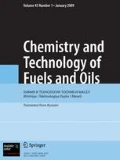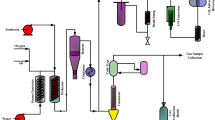Heat integration of oil refining processes is an effective instrument in the technological modernization of industrial facilities. A more rational use of the heat carried by internal process streams is of particular importance for such energy-intensive technologies of heavy oil residue cracking as delayed coking. In this work, we construct a model of the existing heat exchange network of a petcoke production unit and analyze it using pinch analysis. The conducted study revealed violations of the basic pinch principles committed when designing the existing network. An approach to enhancing the energy efficiency of the process was proposed, involving retrofitting of the existing equipment without expanding the heat exchange surface.



Similar content being viewed by others
References
R. G. Gabbasov, V. P. Zaporin, et al., Neftegazovoe Delo, No. 2, 90–93 (2010).
P. Barthe, M. Chaugny, S. Roudier, et al. Best Available Techniques (BAT). Reference Document for the Refining of Mineral Oil and Gas Luxembourg. Publications Office of the European Union (2015).
L. Yanping, W. Xu, and F. Xiao, Heat Integration of a Delayed Coking Plant, International Conference on Energy and Environment Technology, 687–690 (2009).
Federal Law No. 296-FZ (amended on 03.08.2018) “On Limiting Greenhouse Gas Emissions”.
A. E. Khusanov, L. M. Ulyev, B. M. Kaldybaeva, et al., Modeling and Optimization of Energy Consumption, Reduction of Pollution Industrial Enterprises Based on Process Integration Using Pinch Analysis Methods, Shymkent, Yuzhno-Kazakhstan State University named after M. Auezov (2017).
A. S. Khidiyatullin, I. Yu. Gareeva, et al., Neftegazovoe Delo, No. 3, 183–197 (2016).
V. V. Malenkykh, Improving the Efficiency of Isomerization Plants through the Preparation of Raw Materials and the Rational Separation of Products. Diss. Cand. Tech. Sci., Omsk, OmGTU (2016).
R. Smit, J. Klemesh, L. L. Tovazhnyansky, et al. Fundamentals of the Integration of Thermal Processes, Kharkov, NTU KhPI (2000).
Author information
Authors and Affiliations
Corresponding author
Additional information
Translated from Khimiya i Tekhnologiya Topliv i Masel, No. 3, pp. 22–26 May–June, 2022.
Rights and permissions
Springer Nature or its licensor holds exclusive rights to this article under a publishing agreement with the author(s) or other rightsholder(s); author self-archiving of the accepted manuscript version of this article is solely governed by the terms of such publishing agreement and applicable law.
About this article
Cite this article
Sidenev, D.M., Savelyev, S.A., Valyeva, A.R. et al. Enhancing the Heat Exchange Efficiency of a Delayed Coking Unit. Chem Technol Fuels Oils 58, 444–448 (2022). https://doi.org/10.1007/s10553-022-01403-6
Published:
Issue Date:
DOI: https://doi.org/10.1007/s10553-022-01403-6




